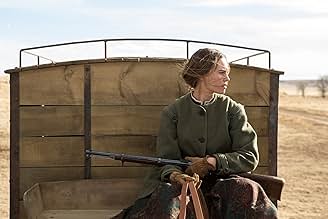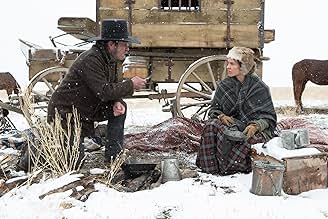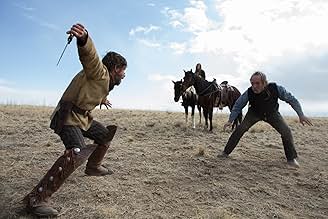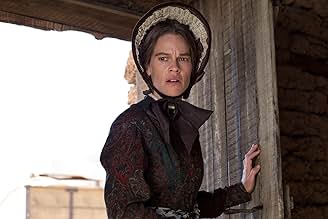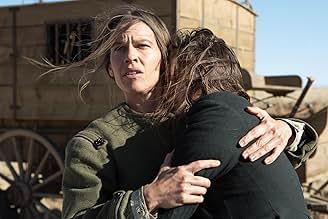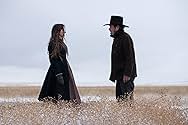The Homesman
- 2014
- Tous publics
- 2h 2m
Three women who have been driven mad by pioneer life are to be transported across the country by covered wagon by the pious, independent-minded Mary Bee Cuddy, who in turn employs low-life d... Read allThree women who have been driven mad by pioneer life are to be transported across the country by covered wagon by the pious, independent-minded Mary Bee Cuddy, who in turn employs low-life drifter George Briggs to assist her.Three women who have been driven mad by pioneer life are to be transported across the country by covered wagon by the pious, independent-minded Mary Bee Cuddy, who in turn employs low-life drifter George Briggs to assist her.
- Awards
- 5 wins & 14 nominations total
Featured reviews
But periodically, just occasionally, once in a while, he inhabits the screen in a manner that forces one to reconsider one's judgment. And so it is with The Homesman.
The Homesman is something of a surprise, and not just because Tommy Lee Jones is on remarkable form in it. Beyond a fine performance, the man writes, directs and co-produces it. Hell's bells, when did he become so damn good at everything?
In the bad old days of the pioneers in the Wild West, Mary Bee Cuddy (Hilary Swank) steps in when three women drift into various states of madness and need to be transported across the country to be cared for properly. Shunned by their husbands, denied help from the town's menfolk and at a time where rape and murder hides behind every outcrop of rock and every gnarled cactus, Cuddy sets off alone on her hazardous journey. She stumbles across George Briggs (Tommy Lee Jones), a drifter seated atop his horse, with a noose around his neck, waiting for his steed to grow bored and leave him hanging. Literally. Cuddy offers to save him on the condition that he accompanies her and so begins a particular kind of journey.
The Homesman is probably described by many as a western, but that's lazy. This is a road movie on horseback, a saunter across the plains, a journey through mistrust and emotions where a mistake or misplaced trust will result in death. It is a story of hope and love, not the romantic kind, but real love for one's fellow human being, regardless of whether they can, or will, reciprocate.
Shot beautifully with sprawling, dusty vistas that warm the heart and prickle the nape, the backdrop is a vast canvas of character and mystery upon which splashes of colour are smeared in the shape of wandering, human dangers.
Though they say little, the trio of women (Grace Gummer, Miranda Otto and Sonja Richter) are far more than peripheral characters or the MacGuffin; they are the substance that binds The Homesman and the reason for the drama, gentle though it is. As we saw in Mr. Turner, such characters can so easily become pantomime animals with over performance that slaps the viewer in the face and detracts from the whole, of which they are but a small part. Not so here. Grace Gummer, particularly, as the mostly mute but vacantly animated Arabella is terrific and we want to reach into the screen and gently push her back towards sanity. It is a beautiful, understated performance that remains in mind long after the event.
Tommy Lee Jones and Hilary Swank make a surprising double act but the chemistry is there in abundance. Both Cuddy and Briggs carry their own needs and daemons with them; neither would give the other a second glance ordinarily but circumstance prompts odd, emotional couplings and theirs is fraught with suspicion and obligation. It is fantastic to see Swank back to the form that brought her gongs and made us sit up and watch in Boys Don't Cry and Million Dollar Baby. This is a far less demonstrative performance, but no less steely or impactful because of it.
Tommy Lee Jones's performance is the most compelling, engrossing that I can recall. Beyond that, his direction is worth celebrating loudly. The Homesman is only his second feature as director (after 2006's wonderful but little seen The Three Burials of Melquiades Estrada) but there are hints that he may step into Clint Eastwood's shoes alongside Ben Affleck and Sean Penn. Just when we think we have the measure of this tale, he belts us sharply around the jowls, proving he has the mettle to surprise and shock us out of our complacency.
Maybe, after years and years of apparently coasting, broodily on film and staring into space, it will transpire he was merely absorbing, waiting for the moment to own both sides of the screen and captivate us.
You know what, maybe he's always been this good but I just didn't see it.
For more reviews from The Squiss, subscribe to my blog and like the Facebook page.
Tommy Lee Jones directed, co-wrote and stars in this western/drama film (set in the 1850s midwest) about a 'spinster' and a 'drifter' transporting three women, driven mad by the hardships of the time, across the country. It costars Hilary Swank, Miranda Otto, Grace Gummer and Sonja Richter. It also features cameos by Meryl Streep, John Lithgow, James Spader, Tim Blake Nelson, William Fichtner and Hailee Steinfeld. The film was written by Jones, Kieran Fitzgerald and Wesley Oliver and it's based on the 1988 novel, of the same name, by Glendon Swarthout. French filmmaker Luc Besson served as a producer of the movie and it also features a breathtaking music score by Marco Beltrami. It's surprisingly dark, and extremely disturbing, but I enjoyed it due to it's strong character development, outstanding performances and odd beauty.
Swank plays Mary Bee Cuddy, a strong and independent 31-year-old woman from New York. She desperately wants to find a husband but can't, due to men finding her too plain looking (I don't think Swank looks bad at all in this movie, considering the film's time and setting). When the local reverend (Lithgow) asks for someone to transport three women across the country, to a church in Hebron Iowa, Cuddy volunteers. The women (Otto, Gummer and Richter) are all mentally ill and the church will provide the special help they need. Cuddy comes across a drifter named George Briggs (Jones), who's about to be lynched for 'claim jumping', and asks him for his help (in return for saving his life). The two make the long journey together and form an odd bond.
The movie has been called a 'feminist western', by many, and I'd definitely agree it's a strong female character study, about the hardships women faced at the time. Swank is outstanding in the co- lead and Jones is just as classic and tough as ever; he does (unintentionally I think) steal some of the female cast's thunder. Jones also proves he's an equally talented director (once again) and the movie is full of beautiful visuals, as well as haunting imagery. For me the highlight of the film is the beautiful music and the touching relationships formed by the movie's central characters (it also has a shocking and unexpected twist, at the end of the second act). It's a hard film to watch, at times, but definitely worth it; if you're a fan of the genre or even if you're not.
Watch our movie review show 'MOVIE TALK' at: http://youtu.be/1_bZp5ejQ4I
Prarie madness sets in and three women are slated to be returned Back East. The problem is that one of the three "responsible" men is unwilling to step up, so a woman volunteers. She is strong and courageous, more than most men, but isolated and desperate for a husband because she is "bossy, and plain as an old tin can."
Her ultimate fate is incongruous, completely at odds with her character. A willful suspension of disbelief is required at this point.
Solid performances by Swank, Jones, Lithgow, and the actress who played the madwomen make it entertaining, if a bit long.
There have been hundreds of relatively good westerns produced in the past half century where the hero and heroine remain strong and stoic whilst riding through the barren lands their suits and dresses remain pressed and in pristine condition while their hair is coiffed perfectly, and miraculously the heroine's makeup never dries, cracks or runs. Well such is not the case in the Homesman.
Hilary Swank has never been afraid to shed the glamor of Hollywood and for her role as the stubborn, single, and capable farmer Mary Bee Cuddy the potential suitors that she asks to marry her turn her down and explain that she is far too plain looking, sexless, and too controlling in nature. So Mary Bee Cuddy agrees to make the arduous journey across the western plains maybe in the hope of finding a suitor in Idaho as she has run out of potential suitors in Nebraska and seems to be losing hope in raising a family on her own farm in Nebraska.
As Mary Bee Cuddy commences her journey she comes across someone even more homely and desperate than herself in the name of aging drifter George Briggs who is within minutes of losing his life at the end of a rope for illegally claiming mining rights to another persons staked property. The terms set forth by Mary Bee Cuddy before she will agree to free George Briggs from his futile situation and imminent death by hanging are simple. He must first agree to travel across the western plains of Nebraska to assist Mary Bee Cuddy in the transportation of three insane women to a church in Idaho where they will receive the care and attention they will require to survive.
And so the two hardened caretakers and their three insane passengers set out on their journey which I found to be not like any other western I had previously seen. This is not a humorous and light hearted western but a tough, grueling, and sad journey with what I was surprised provided unexpected results. Some people may not be happy with the last 30 minutes of this feature film, but this is actually where writer/actor/director Tommy Lee Jones hooked me with what I felt was a good feature film that ended strongly.
There are numerous cameos throughout the film including standout performances by Tim Blake Nelson as a lonesome cowboy, John Lithgow as Reverend Dowd, and Jesse Plemons as a derelict husband to one of the insane women. Look for mother Meryl Streep in Idaho as the Reverends wife Altha Carter who enjoys sharing the screen with her real life daughter Grace Gummer who plays one of the three insane women Arabella Sours.
I give the film a good 7 out of 10 rating.
The Homesman is an emotionally and powerful, idea-rich, almost humorless story -- with an immense amount of humor. It has very tight, economic tale telling with no fat on the bone; in which much is implied, historical accuracy hits its target by nuance, and the story itself is deeply respectful of an intelligent audience.
The Homesman is not "entertainment" in the haha, shoot-'em-up Western sense. It's realism committed to a moral cause -- criticism of the disenfranchised, the homeless, the people who cannot make it no matter how hard they try. It has a brilliant sense of time and place that tells the life stories of dozens of hard-enduring, long-suffering "forgotten men" -- the women no less than the men.
The key heartbreaker is Hilary Swank's character of Miss Mary Bee Cuddy. She's born into a Western frontier world where she and everyone else believes and practices that "No man, having put his hand to the plough, and looking back, is fit for the kingdom of God." Hard workers and decent people. But tragically that is not enough. Why? The Homesman leaves that question deliciously unanswered. Life is not fair. God is not just.
Beautifully The Homesman does -- kind of -- answer life's problems with the value of sheer vitality and gutsiness itself. Thus that key visual motif in the movie that comes from: George Caleb Bingham, "The Jolly Flatboatmen". We must dance the dance of life, however mad.
Did you know
- TriviaGlendon Swarthout's novel was published in 1988. Paul Newman owned the rights, and wanted to direct the film himself. After several failed scripts, he gave up.
- GoofsDuring the Indian attack, every shot of the carriage has mountains in the background. The road from Nebraska to Iowa is nowhere near any mountains.
- Quotes
George Briggs: Are you an angel?
Mary Bee Cuddy: You're not dead.
George Briggs: Help me. Will you help me? For God's sake.
- ConnectionsFeatured in Film '72: Episode dated 19 November 2014 (2014)
- SoundtracksRosalie The Prairie Flower
Music & Lyrics by George Frederick Root (as George Fredrick Root)
Performed by Hilary Swank
- How long is The Homesman?Powered by Alexa
Details
Box office
- Budget
- $16,000,000 (estimated)
- Gross US & Canada
- $2,429,989
- Opening weekend US & Canada
- $45,433
- Nov 16, 2014
- Gross worldwide
- $3,819,421
- Runtime2 hours 2 minutes
- Color
- Sound mix
- Aspect ratio
- 2.39 : 1
Contribute to this page








